Citric Acid For Cleaning | Ultimate Home Cleaning Solution
If you've ever read the list of ingredients on a modern cleaning solution, you'll undoubtedly find a frightening number of hazardous substances. While they could be excellent at eliminating dirt and bacteria, the majority of those chemicals wind up in our water supply, seriously harming marine life. These can even be harmful for your health.
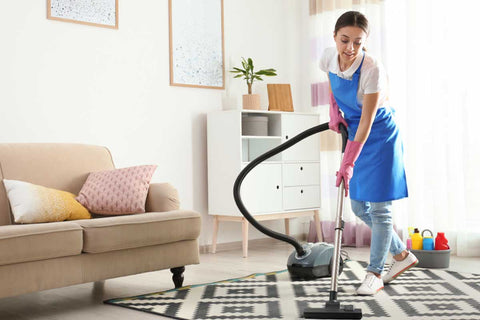
We have a better solution - Citric acid for cleaning! Citric acid cleaning is an option that every family should take into account. One of the most adaptable all-natural cleaning solutions and one of the greenest methods to clean your house is citric acid powder. Let's start by talking more about citric acid powder for cleaning.
Is Citric Acid Safe For Cleaning?
The best cleaning ingredient is frequently said to be baking soda. It is risk-free on many different surfaces, eliminates odours, and even preserves the lustre of your white shoes. Citric acid helps break down any filth, dirt, and build-up, but it is sometimes disregarded when it comes to cleaning your house.

You may simply and safely get rid of germs, mold, and mildew in your house by using citric acid. Citric acid is a safe option for cleaning your house because it can be consumed and is used in food. Surfaces that come into contact may be cleaned without difficulty. It is better than most other cleaning options.
Benefits Of Citric Acid For Cleaning
Citric acid has a mild bleaching effect, works as a bactericide and fungicide, and aids in dissolving stains so they may be washed away. Here's how you can use it:

1. Citric Acid For Toilet Cleaning
You'll notice a slow accumulation of water stains in your toilet bowl. Despite your best efforts, they remain stubbornly in place. Spray a mixture of citric acid over the toilet bowl every time you clean it to get rid of these stains. You may need to clean the toilet bowl with citric acid in a stronger solution if the discoloured parts don't seem to be coming off readily.
2. Citric Acid For Cleaning Washing Machine
The same thing can happen to your washing machine as it does to your dishwasher, but a washing machine often sustains greater damage due to limescale buildup and laundry detergents. This remedy calls for you to create a mix of baking soda and citric acid to clean the buildup. This advice will prevent the frequent destiny of washing machines in which the heating element fails due to excessive limescale buildup.
3. Citric Acid For Cleaning Countertop Oven Racks
Your toaster oven racks may become rather filthy with baked-on grease, oil, and food drippings. This makes them challenging to clean. The grease may be broken down for simple cleaning by giving it a brief soak in water and citric acid.
To get the powder to dissolve, add two heaping teaspoons of citric acid to a pail of hot water (deep sink, bathtub). After that, add the racks and give them a 20 to 30-minute soak. A decent cleaning brush should make grease spots disappear without much effort.
4. Citric Acid For Cleaning Floors
You may create a solution that you can use to clean your shower, kitchen counters, and other surfaces by mixing a few teaspoons of citric acid with a spray bottle of water. Citric acid shouldn't be used on marble or other natural stone since it might corrode the material. Your floors may be cleaned with citric acid quite effectively.
5. Citric Acid For Descaling Coffee Machine
Empty the filter basket and any remaining coffee from the carafe before giving your coffee maker a thorough cleaning. Rinse the filter basket and carafe before replacing them both in the appliance. Then, add around 2 teaspoons of citric acid and the remaining water to the carafe.
To dissolve, stir. Set the machine to brew after completely adding this to the reservoir. After the brewing is finished, drain the water from the carafe and run a second (and third, if necessary) pot of pure water to flush out any residual citric acid. The glass carafe will be spotless and the machine will be free of any mineral buildup. repeat each month.
How To Make Citrus Acid Cleaner At Home?
Citric acid is wonderful since it is non-toxic and biodegradable. It is also secure to use around kids and animals. Here's how you can make your own citric acid cleaner:
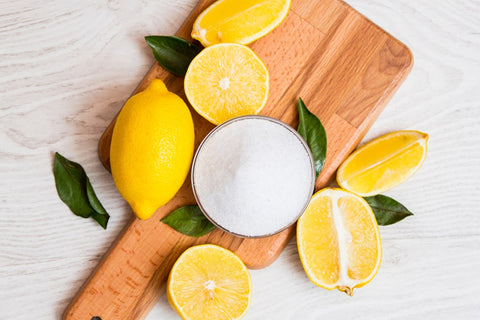
Ingredients
- Hot Water - 1.8 Liter
- Citric Acid Powder - ¼ Cup
- Lemon Essential Oil - 15 Drops
- Orange Essential Oil - 20 Drops
How To Make
- In a spray bottle, combine hot water and citric acid.
- Shake vigorously after adding the lemon and orange essential oils.
- Use to clean surfaces in your home as required.
How To Use Citric Acid For Cleaning?
Once you have made your citric acid cleaner, there are so many ways in which you can use it for cleaner. Below are some of them to help you make your life easier!
1. Citric Acid For Rust Removal
A bucket or other container large enough to accommodate your rusty instruments should be filled with a batch of the citric acid all-purpose cleaner. Clean the goods with a scouring pad or brass wire brush after soaking them for 30 to 60 minutes.

Continue to soak and scrub, stopping occasionally to let the tools sit so that the solution may work its magic on the rust. After each usage, immediately dry your tools and then oil them with mineral oil or clean motor oil to stop further corrosion.
2. Citric Acid Powder For Dishwasher
Hard water deposits accumulate over time in dishwashing hoses and connections. In order to disassemble and eliminate the buildup, citric acid may enter all of those tiny crevices.
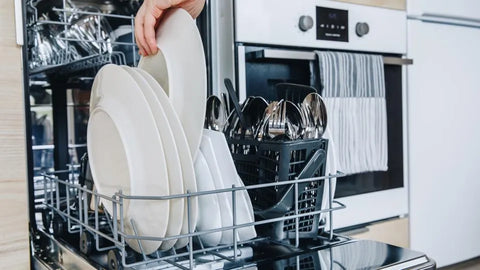
Citric acid powder should be added to the empty detergent cup of the dishwasher before running the normal, longest, and hottest cycle without any dishes. To get rid of any residual mineral deposits, run the machine a second time with standard detergent (and dishes, if you choose).
3. Citric Acid For Kettle
Cleaning your coffee maker or tea kettle naturally with citrus acid is a terrific idea. Two tablespoons of citric acid should be added to each quarter of water in the pot, and it should be let to sit for an hour.
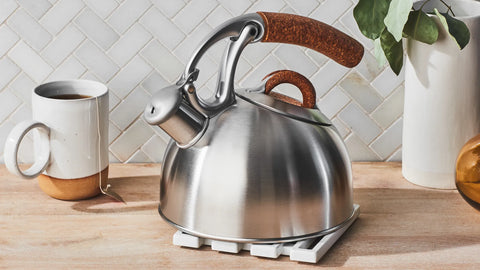
After that, scrub with a brush while rinsing with hot water. Your coffee maker will be spotless!
4. Citric Acid For Washing Clothes
Allergies and skin irritation can be brought on by detergents and fabric softeners. Citric acid helps to effectively remove persistent stains from garments while also better protecting delicate skin.

The process is as follows: For every wash, mix 5 to 6 teaspoons of citric acid with a litre of water and place 2 dosage caps in the fabric softener compartment!
Only white laundry should be treated with citric acid because it has a bleaching effect.
5. Citric Acid For Cleaning Humidifier
Hard water deposits are prone to accumulating around the heating port and at the base of the water tank in humidifiers.
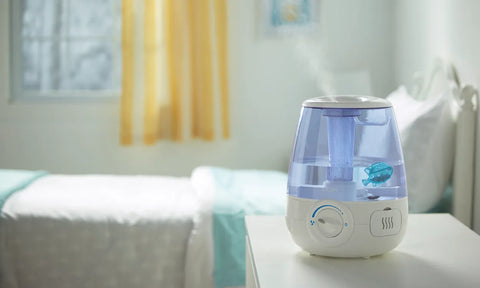
If you've tried to scrub this area with vinegar, baking soda, and any other cleaning solution you can think of without success, a generous sprinkle of citric acid powder applied with a brush or sponge can do wonders to get rid of the build-up with little to no scrubbing.
6. Citric Acid Powder For Descaling
A hot water heater may accumulate hard water deposits, which will reduce its efficiency and even cause it to malfunction. Citric acid may also be used to clean out your hot water heater, but it requires a little more work.

300 ml of citric acid should be added to the cold water intake and allowed to dissolve after it has sunk to the bottom. Before entirely draining the tank, boil the water and let the acid work its magic on the mineral deposits for 4–8 hours.
7. Citric Acid For Toilet Tank
A versatile material, citric acid may be utilised for a range of cleaning jobs. For instance, you can clean the toilet bowl with citric acid.
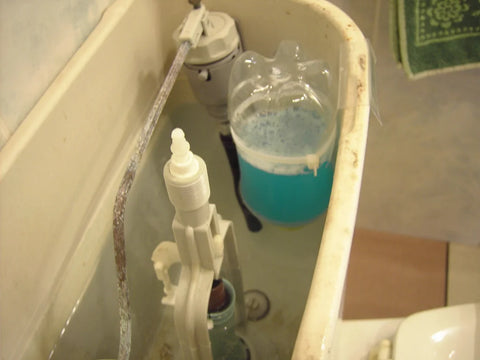
Simply add citric acid to the toilet bowl, then wait approximately an hour for it to work. After that, flush the toilet after brushing it. Any accumulated filth and debris in the toilet bowl will be removed with the aid of the citric acid.
8. Citric Acid For Stain Removal
Plastic, melamine, and even porcelain plates may become stained by some meals. Boiling water should be poured into a sizable vessel or the sink to erase the stains.

For every cup of water, add one tablespoon (or half a cup) of citric acid powder. After adding the dishes, let them soak for three to four hours. normal washing.
9. Citric Acid For Sanitizing
Cleaning with citric acid is a safe and efficient method for all types of surfaces, including butcher blocks and glass stove tops. Simply use your Citric Acid Cleaner to spritz the counter.
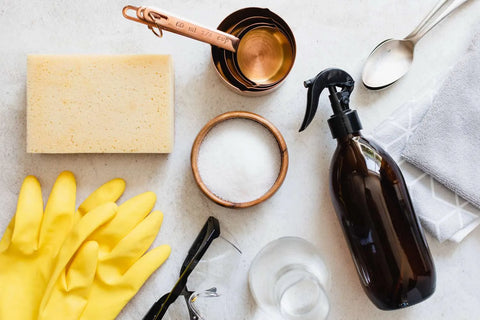
Allow to stand for a minute or two, then rinse and pat dry. Not only will your counters be cleaned, but they'll also be sanitised. Try not to use this technique on granite or marble, since the acid combination can harm the sealer on those more expensive slabs.
10. Citric Acid For Hard Water Stains
For hard water stains on your windows, citric acid works wonders. Use a spray bottle filled with water and citric acid to clean your windows.

Simply spray it on the window, wait 5 to 10 minutes, and then wipe it down with a paper towel.
Do's and Don'ts of Cleaning with Citric Acid
Do’s
1. Always dilute the citric acid powder with water in order to create a cleansing solution.
2. Before using the cleansing solution on a larger area conduct a patch test to ensure it does not damage the surface or cause discoloration.
3. Citric acid cleansing solution can be used for cleaning kitchen counters, appliances, bathroom fixtures, glass and mirrors, and sinks.
4. It can be easily combined with other natural cleansers like baking soda to formulate a stronger cleansing solution.
5.Citric acid is also known to kill bacteria, mildew, and molds creating a cleaner and hygienic place.
Don’ts
1.Citric acid can be harsh to use on delicate surfaces like marble, granite, and certain type of woods.
2.Do not mix citric acid powder with bleach as it produces harmful fumes.
3.Citric acid is known to react with aluminium so avoid using it.
4.Do not expect citric acid to work wonders in the first attempt as the results can be seen after a while.
Conclusion
A nice and natural approach to get rid of bacteria in your house is using citric acid. Additionally, it has been demonstrated scientifically to be safe for your family as well as you. Try using citric acid, especially the one sold by VedaOils, to clean your home if you want to do more to safeguard the environment, particularly marine life and your own family.
Frequently Asked Questions
Q.1 Where Can I Buy Citric Acid For Cleaning?
Ans: You can get organic citric acid at VedaOils.
Q.2 Can I Use Vinegar Instead Of Citric Acid For Cleaning?
Ans: Citric acid doesn't leave a sour scent behind, which leads some people to assume it is better for cleaning than vinegar. However, citric acid can occasionally cost more than vinegar.
Q.3 Can Citric Acid Be Used For Cleaning Dishwasher?
Ans: Dishwashers with interiors made of plastic or stainless steel might benefit from the use of citric acid to aid in cleaning. Crystals of citric acid, sometimes known as "sour salt," can be found in the spice or canning area of most grocery shops and certain pharmacies and even online.
Q.4 Why Citric Acid Is Used For Ro Membrane Cleaning?
Ans: Inorganic scale, metal oxides/hydroxides, and inorganic-based colloidal particles may all be removed using a 2% solution of citric acid.
You May Also Like:
Buy Products
-
 Citric Acid Powder
Citric Acid Powder -
 Lavender Essential Oil
Lavender Essential Oil -
 Lemon Essential Oil
Lemon Essential Oil -
 Sweet Orange Essential Oil
Sweet Orange Essential Oil -
 Virgin Coconut Oil
Virgin Coconut Oil
Related Articles
-
 DIY Glycerin Moisturizer – 3 Natural Homemade Recipes For Face
DIY Glycerin Moisturizer – 3 Natural Homemade Recipes For Face -
 DIY Cleansing Oil - Best Homemade Recipe For All Skin Types
DIY Cleansing Oil - Best Homemade Recipe For All Skin Types -
 How to Make Marble Candles | DIY Marble Pillar Candle
How to Make Marble Candles | DIY Marble Pillar Candle -
 DIY Tanning Oil - Best Homemade Recipes For Tan Removal
DIY Tanning Oil - Best Homemade Recipes For Tan Removal -
 Homemade Mustache Wax: Best DIY Recipe With Natural Ingredients
Homemade Mustache Wax: Best DIY Recipe With Natural Ingredients -
 Kojic Acid vs. Glycolic Acid: Which Is Better for Skin Whitening?
Kojic Acid vs. Glycolic Acid: Which Is Better for Skin Whitening?
Disclaimer :- This article is intended for informational and educational purposes only and should not be considered a substitute for professional medical advice. For specific health concerns or treatment, please consult your personal physician. The article's editor, writer, and VedaOils organization do not assume any responsibility for any health outcomes resulting from the information provided. Readers are strongly encouraged to seek advice from their physician before acting on any recommendations made in these articles.
















 Sign in
Sign in Register now
Register now My Reward Points
My Reward Points









